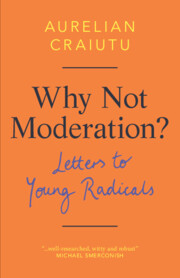Book contents
- WHY NOT MODERATION?
- Why Not Moderation?
- Copyright page
- Dedication
- Contents
- Caveat lector!
- About This Book
- Prologue Why Radical Moderation?
- PART I THE WORLD WE LIVE IN
- PART II WHAT KIND OF VIRTUE IS MODERATION?
- PART III DO MODERATES HAVE A POLITICAL VISION?
- Interlude
- 1 The Limits of Moral Clarity
- 2 Against the Politics of Warfare
- 3 No Manichaeism and No Litmus Tests
- 4 Compromise
- 5 Trimming and Balance
- 6 Centrism
- 7 Eclecticism and Pluralism
- 8 Dialogue
- PART IV THE ETHOS OF MODERATION
- PART V WHO NEEDS MODERATION TODAY?
- Acknowledgments
- Notes
- Index
3 - No Manichaeism and No Litmus Tests
from PART III - DO MODERATES HAVE A POLITICAL VISION?
Published online by Cambridge University Press: 12 October 2023
- WHY NOT MODERATION?
- Why Not Moderation?
- Copyright page
- Dedication
- Contents
- Caveat lector!
- About This Book
- Prologue Why Radical Moderation?
- PART I THE WORLD WE LIVE IN
- PART II WHAT KIND OF VIRTUE IS MODERATION?
- PART III DO MODERATES HAVE A POLITICAL VISION?
- Interlude
- 1 The Limits of Moral Clarity
- 2 Against the Politics of Warfare
- 3 No Manichaeism and No Litmus Tests
- 4 Compromise
- 5 Trimming and Balance
- 6 Centrism
- 7 Eclecticism and Pluralism
- 8 Dialogue
- PART IV THE ETHOS OF MODERATION
- PART V WHO NEEDS MODERATION TODAY?
- Acknowledgments
- Notes
- Index
Summary
This chapter shows the limits of political Manichaeism with reference to the career of Maximilien Robespierre and his fellow Jacobin leaders during the French Revolution. It criticizes the use of litmus tests and the search for purity in political life, it also engages with the rhetoric of key members of the Claremont Institute whose radical agenda shows disturbing similarities with that of the Jacobins.
Keywords
- Type
- Chapter
- Information
- Why Not Moderation?Letters to Young Radicals, pp. 94 - 102Publisher: Cambridge University PressPrint publication year: 2023

